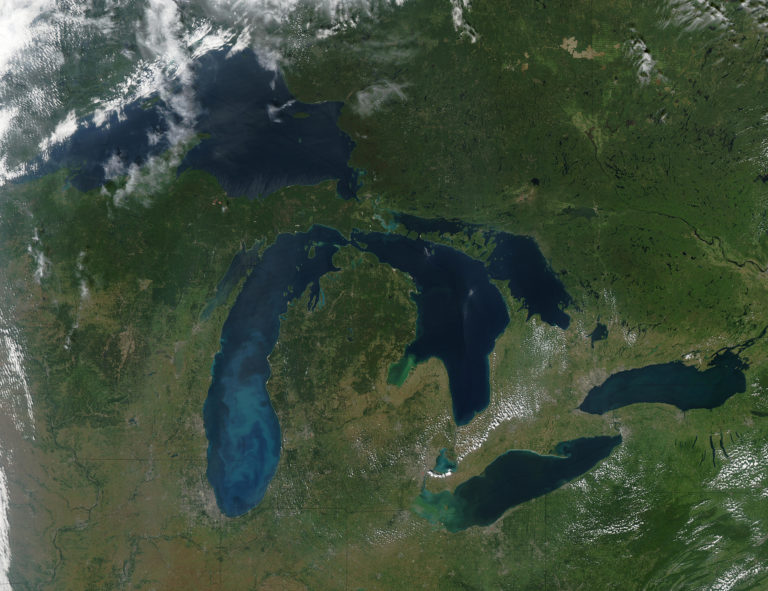Great Lakes Waterkeepers and Waterkeeper Alliance Urge Canadian Authorities to Ditch the Great Lakes Nuclear Dump
By: Waterkeeper Alliance

Groups Renew Plea to U.S. Secretary of State to Oppose Threat to Drinking Water Supply for 40 Million People
NEW YORK, NY – May 27, 2015 – Environmentalists in the Great Lakes Basin are opposed to a new report from a Canadian Joint Review Panel that has called for the support of the Canadian Minister of the Environment to approve a deep geological repository for nuclear waste in Kincardine, Ontario due to its proximity to drinking water supplies for 40 million people in the United States and Canada. The proposed plan from Ontario Power Generation (OPG) is to store underground radioactive nuclear waste less than one mile from the shores of Lake Huron. Canadian officials are getting closer to approving this hazardous project and could even fast track the authorization of a final license within the next few months.
Under the Binational Great Lakes Water Quality Agreement (amended in 2012), both Canada and the US acknowledge the importance of anticipating, preventing, and responding to threats to the waters of the Great Lakes. Both countries share the responsibility and obligation to protect these shared waters from pollution.
“Great Lakes Waterkeepers and Waterkeeper Alliance oppose this project, which could threaten the drinking water supply of 40 million Americans and Canadians,” said Bob Burns, Detroit Riverkeeper. “We ask the U.S. State Department to stand with the citizens, local and state governments, and other stakeholders in the Great Lakes Basin whose voices have not yet been heard but who are at risk if the deep geological repository fails.”
Last September, the groups wrote to Secretary of State John Kerry and Canadian officials urging them to vote against this nuclear storage facility.
“With the Great Lakes containing 95% of the North America’s supply of fresh surface water, this is one of the worst possible locations for a permanent nuclear waste burial facility,” stated Doug Martz, St. Clair Channelkeeper. “Ontario Power Generation, the project proponent, did not investigate any other sites for this repository, but rather, selected the site based on the willingness of one local community. Furthermore, approval of this facility would set a devastating precedent for allowing other nuclear waste repositories to be located in the Great Lakes Basin.”
Marc Yaggi, executive director of Waterkeeper Alliance added: “The Great Lakes are suffering from failing infrastructure, contamination leaching from historical industrial and nuclear waste sites, ongoing agricultural pollution and invasive species. Intentionally siting a new toxic nuclear waste site in such close proximity to the largest fresh water system in the world would severely imperil the water security of two nations. The time to act is now, and we call again on Secretary Kerry to take action.”
The eight Waterkeeper organizations in the Great Lakes support proposed resolutions in the U.S. House of Representatives and Senate to urge government action to ensure that the Canadian Government does not permanently store nuclear waste underground in the Great Lakes Basin.
Contacts:
Tina Posterli, Waterkeeper Alliance, [email protected], 516
Doug Martz, St. Clair Channelkeeper, [email protected], 586.764.2443
Bob Burns, Detroit Riverkeeper, [email protected], 734.676.4626
###
Waterkeeper Alliance is a global movement uniting more than 250 Waterkeeper organizations around the world and focusing citizen advocacy on issues that affect our waterways, from pollution to climate change. Waterkeepers patrol and protect more than 2 million square miles of rivers, streams and coastlines in the Americas, Europe, Australia, Asia and Africa. For more information please visit: www.waterkeeper.org
The 8 Waterkeeper organizations in the Great Lakes are: Buffalo Niagara Riverkeeper, Detroit Riverkeeper, Grand Traverse Baykeeper, Lake Erie Waterkeeper, Milwaukee Riverkeeper, St. Clair Channelkeeper, Upper St. Lawrence Riverkeeper and Yellow Dog Riverkeeper.